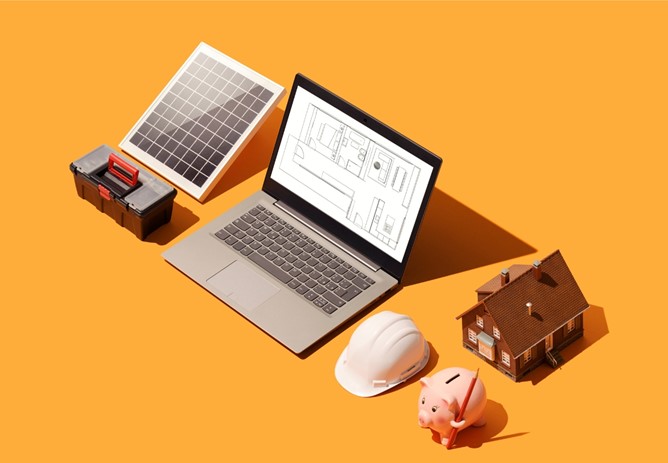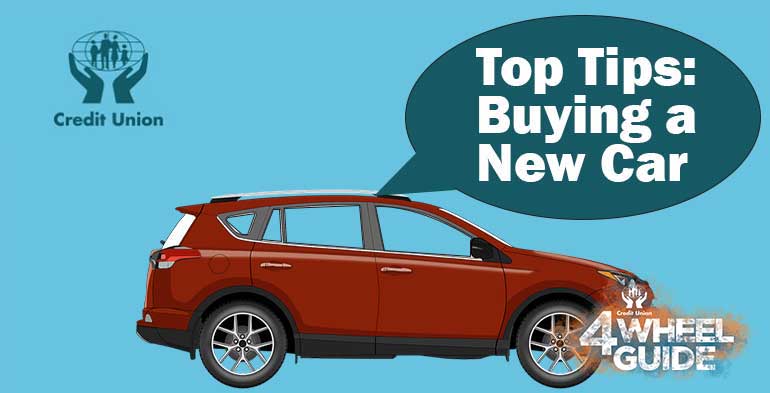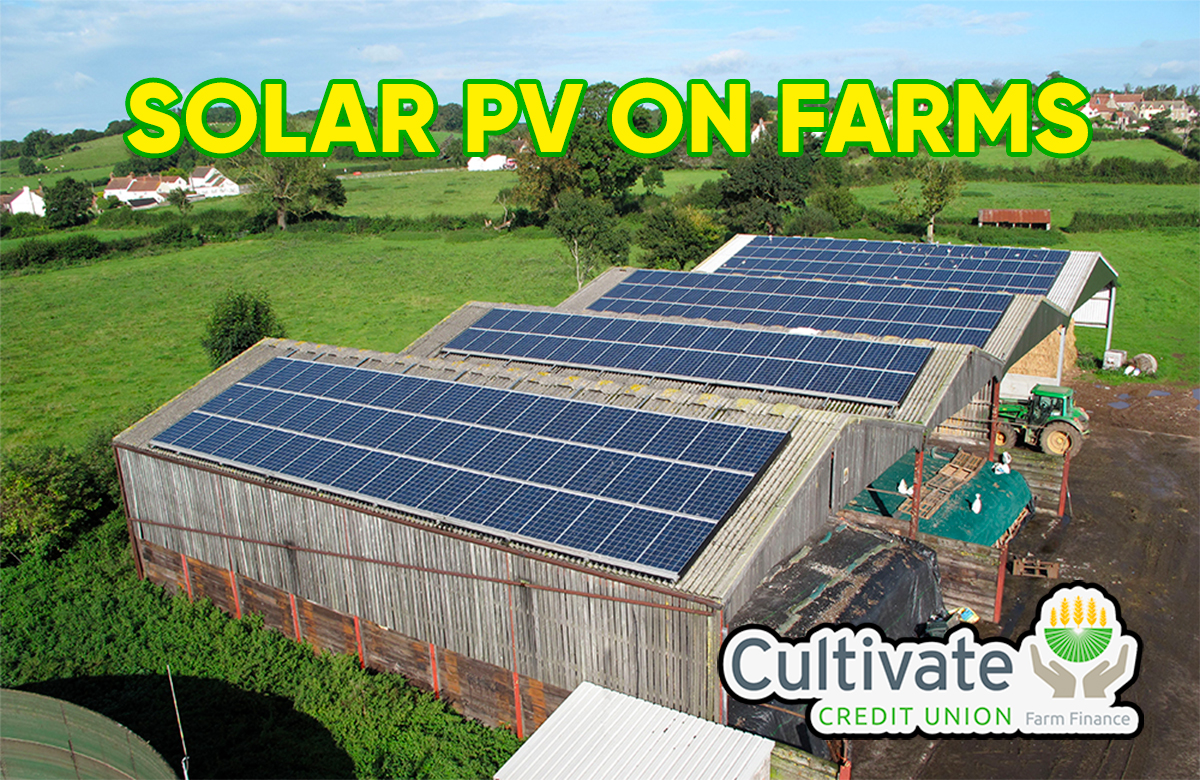20 August 2024
A Guide to Financing Home Improvements in Ireland in 2024
Understanding the landscape of home improvement finance is a crucial step towards creating your dream home. From deciphering between home improvement loan options, to identifying incentives for home energy efficiency upgrades and opportunities to avail of green loans, this guide aims to provide you with the know-how you need to confidently navigate this sometimes confusing financing landscape.
So, whether you're aiming for a full-scale remodel or looking to incorporate upgrades, we’re here to support you turn your dreams into a reality.
Understanding Home Improvement Finance Options in Ireland
There are a host of home improvement loan options that cater to various needs, preferences, and situations. Each option carries its own set of features, requirements, and benefits, making them more suitable for certain situations and types of home improvements than others.
Personal loans are a popular option, often because they are unsecured, meaning you don’t have to put your home up as collateral. This type of loan can be used for any purpose, including home improvements. It's often suited to smaller projects due to the generally lower loan amounts available and the shorter repayment periods.
Home improvement loans are specifically designed for home renovations and upgrades. They typically have competitive interest rates and offer larger loan amounts. These loans can finance a broad scope of projects, from minor refurbishments to extensive renovations, making them an excellent choice for significant home improvements.
Home equity loans or refinancing your mortgage provide another way to finance larger home improvements. These options allow you to tap into the equity in your home, and while they often involve more paperwork, they generally come with lower interest rates than personal loans.
Finally, green loans are specially designed for energy-efficient home improvements. These loans often come with lower interest rates and may also grant eligibility for governmental incentives. From installing solar panels to improving insulation, green loans are a great fit for homeowners looking to reduce their carbon footprint and lower their energy bills.
Getting the right financing that aligns with your financial capacity and your home improvement goals will maximise return on investment, and minimise financial stress.
Home Improvement Finance Options Compared
Understanding the scope of each option can be crucial in making the right decision for your individual circumstances.
Housing Grants
What is it?
Housing grants are a type of financial aid provided by the government to homeowners and residents to facilitate necessary improvements or modifications to their properties. They cover a range of improvement projects, from increasing energy efficiency to enhancing accessibility for elderly or reduced mobility individuals.
Pros
Housing grants can be a significant saver for homeowners, as they don't need to be repaid, reducing the overall financial burden of home improvements. They are designed to facilitate improvements that enhance the quality of life, and the properties green credentials.
Cons
These grants come with specific eligibility criteria that can be strict. The application process can be lengthy, often involving detailed documentation and waiting periods. Furthermore, housing grants are typically targeted towards specific improvements and may not cover all types of renovation or upgrade projects. For more on the types of grants available, see here.
Most Suitable For
Housing grants are most beneficial for individuals planning to carry out specific improvements that align with the grant's objectives. This could include homeowners planning to install solar panels or improve their home energy rating, to those improvements that enhance the quality of life for elderly or reduced mobility individuals needing accessibility enhancements.
Key Considerations
It's crucial to understand the specific eligibility requirements, as well as the potential waiting time for grant approval and pay out. Finally, it's important to factor in the time and effort required for the application process and to secure all necessary documentation.
Mortgage Top-Up
Pros
One of the primary advantages of a Mortgage Top-Up is the potential for lower interest rates compared to other types of loans. Since the additional amount is essentially an extension of your mortgage, it benefits from the same security and can often be repaid over a longer term. This longer repayment period can lead to more manageable monthly payments.
Cons
While a Mortgage Top-Up can offer lower interest rates, it's important to remember that these are usually spread out over a longer period. This means you could end up paying more in total interest over the life of the loan. Also, since your home serves as collateral, it could be at risk if you are unable to keep up with the repayments. Finally, there may be fees associated with arranging a mortgage top-up, and it could affect your loan-to-value ratio, possibly impacting future borrowing.
Most Suitable For
A Mortgage Top-Up is often most suitable for homeowners who have built up some equity in their property and wish to undertake significant home improvement projects. This method can be particularly beneficial for homeowners who can secure a competitive interest rate and are comfortable with extending the term of their mortgage.
Key Considerations
Assess your ability to meet the increased monthly repayments over the long term. It's also advisable to consider the total cost of the loan, taking into account both the interest and any additional fees. Finally, consider the impact on your equity and future borrowing potential.
Remortgage with a new Mortgage Provider
What is it?
When you remortgage with a new loan provider, you essentially switch your mortgage to a new lender who offers you a loan large enough to pay off your existing mortgage and leave you with a surplus for home improvements. It's a strategy used by homeowners to take advantage of more favourable interest rates or loan terms offered by different lenders.
Pros
Remortgaging can potentially provide a larger sum of money for significant home improvements. It also presents an opportunity to secure a lower interest rate or more favourable terms, which could reduce your monthly repayments.
Cons
On the downside, remortgaging can come with certain costs, including valuation fees, legal fees, and potential early repayment charges from your current lender. The process can also be time-consuming and involve lots of paperwork. Furthermore, switching to a new mortgage provider could extend the length of your mortgage, which means you could pay more in interest over the long term.
Most Suitable For
Remortgaging is often suitable for homeowners who have substantial equity in their home and plan significant improvements that require a large sum of money. It's also a good fit for those who can secure a more favourable mortgage deal with a new lender that outweighs the costs of remortgaging.
Key Considerations
Before considering remortgaging, it's essential to evaluate the total costs involved, including any fees and the total interest paid over the loan term. It's also crucial to assess your financial stability, as your circumstances will be reassessed by the new lender.
If you're considering this option, a discussion with an experienced financial team could provide invaluable insights. At Access Credit Union, we have a deep understanding of the intricacies of home loans and can guide you through the process of switching your mortgage.
Personal Bank or Credit Union Loan
What is it?
A Personal Bank or Credit Union Loan is a type of unsecured loan where you borrow a certain amount of money and repay it, with interest, over a fixed period.
Pros
The key advantage is its flexibility. These loans can be used for any purpose, including various home improvement projects. Additionally, since they are unsecured, they do not put your home at risk. Credit unions often offer competitive interest rates, especially to their members, and may have more flexible lending criteria than traditional banks.
Cons
Because they are unsecured, these loans often come with higher interest rates than secured loans like home equity loans or mortgage top-ups. The loan amounts may also be lower, and the repayment periods shorter, making the monthly payments potentially higher.
Most Suitable For
Personal loans are most suitable for medium-sized home improvement projects where you need a quick and flexible source of funds. They can be a great option if you don’t have equity in your home, or if you want to avoid using your home as collateral.
Key Considerations
Before opting for a personal loan, consider the interest rate, repayment period, and monthly payments to ensure they fit within your budget. Also, be aware that late or missed payments can negatively impact your credit score.
Credit Union Green Home Loan
What is it?
A Credit Union Green Home Loan is a specific type of loan offered by credit unions to finance environmentally friendly, or ’green’, home improvements. This could include projects like installing solar panels, upgrading insulation, or purchasing energy-efficient appliances.
Pros
The main advantage of a Green Home Loan is that it aligns with sustainable living objectives and promotes energy efficiency. Often, these loans come with lower interest rates, recognising the environmental benefits of the improvements. The funds from a Green Home Loan can be used to improve your home's energy rating, reduce your carbon footprint, and potentially lower your energy bills. They also align with the government backed grants offered through the Sustainable Energy Authority of Ireland and can take account of a grant pay out being received by the home owner.
Cons
The use of a Green Home Loan is typically restricted to specific energy-efficiency improvements. Therefore, it will not cover the costs of a broader home renovation project.
Most Suitable For
A Green Home Loan is most suitable for homeowners who are committed to improving their home's energy efficiency and sustainability.
Key Considerations
Before taking out a Green Home Loan, ensure that the improvements qualify for the loan and will provide the environmental benefits you are seeking. It's also crucial to make sure you can comfortably afford the repayments and to compare interest rates and terms with other types of loans.
Home Improvement Financing Options Compared
Housing Grants | Mortgage Top Up | Remortgage | Bank / CU Personal Loan | CU Green Home Loan | |
Pros | No need to repay | Lower interest rates | Potentially lower interest rates | Flexible use | Lower interest rates, sustainability |
Cons | Strict eligibility | Fees, Longer repayment period | Fees and time involved | Higher interest rates | Specific use |
Suitable For? | Specific improvements | Large projects | Large improvements | Medium sized projects | Energy efficient upgrades |
Key Considerations? | Eligibility, Timeline | Total loan cost, Financial stability | Total costs, Financial Stability | Interest rate, Repayment period | Eligibility, Energy Savings, Loan Costs |
Verdict: Best Option for Financing Minor Home Improvements
For minor home improvements, a Personal Bank or Credit Union Loan can be a suitable option. This type of financing allows a good deal of flexibility and often can provide the right level of funding for smaller projects.
Verdict: Best Option for Financing Major Home Improvements
For major home improvements, both Mortgage Top-Ups and Remortgaging can be valuable options, offering the potential to access larger sums of money often needed for substantial projects. Both options allow homeowners to tap into their home equity, but the choice between them will depend on individual circumstances, including the current mortgage terms and potential deals offered by other lenders.
Verdict: Best Option for Financing Energy Efficient Home Improvements
When it comes to financing energy-efficient home improvements, a Credit Union Green Home Loan can be an excellent option. It promotes environmentally friendly upgrades and often offers competitive interest rates.
About Credit Union Green Loans
At Access Credit Union, we aim to help you save on bills while contributing positively to the environment. By opting for our Green Loan, you can enjoy a warmer, more energy-efficient home and play your part in saving the planet - all while saving money!
Our Green Loan process is simple and straightforward, designed to provide you with the best value for carrying out environmentally friendly home improvements.
What Can You Borrow For With a Credit Union Green Loan?
- Insulation: Be it wall, attic, or floor insulation, or upgrades to your windows and doors.
- Ventilation and renewable energy systems: Install a new ventilation system or renewable energy system such as a heat pump or solar panel.
- Boiler upgrades: Upgrade your boiler and insulate pipes, along with installing heating controls.
- Electric or hybrid vehicles: Finance your new electric or hybrid car, along with a home charger unit if necessary.
With our Green Loan, you can borrow up to €50,000, with a maximum loan term of 120 months (10 years). We offer an Annual Percentage Rate (APR) of 5.64%, with no hidden fees or charges, and no penalties for early repayment.
To illustrate the benefits of our Green Loan, let's compare it with similar products from other financial institutions. We'll consider a 5-year term with a €25,000 loan amount.
Loan | APR | Repayments | Monthly Repayment | Total Repayment |
Access CU Green Loan | 5.64% | 60 | €478.00 | €28,653.00 |
AIB Green Loan | 6.40% | 60 | €485.86 | €29,151.60 |
Bank of Ireland Green Home Improvement Loan | 6.50% | 60 | €486.43 | €29,185.80 |
Avant Money Home Improvement Loan | 7.10% | 60 | €493.85 | €29,631.08 |
Permanent TSB Home Improevement Loan | 8.20% | 60 | €505.71 | €30,342.85 |
AIB Home Improvement Loan | 8.95% | 60 | €513.98 | €30,838.80 |
(comparison data based on https://switcher.ie/loans/home-improvement-loans/)
Loans are subject to approval. Terms and conditions apply. If you do not meet the repayments on your loan, your account will go into arrears. This may affect your credit rating, limiting your ability to access credit in the future. Access Credit Union is regulated by the Central Bank of Ireland.
Tips for Navigating Home Improvement Loans
- Assess Your Budget - First, determine the overall cost of your planned home improvements and evaluate your financial ability to repay the loan. Keep in mind, the cost of the project should include not only materials but also labour, contingency, and any unexpected expenses that may arise.
- Research and compare - Take the time to explore different lenders and loan options. Consider factors like interest rates, repayment terms, additional incentives, and penalties. Comparing these factors will help you understand which loan offers the best value for your specific needs.
- Consider future plans - Ensure your chosen financing option aligns with your long-term financial goals and current situation. For example, if you plan to sell your home in the near future, you might opt for a loan with a shorter repayment term to clear the debt before selling.
- Seek expert advice - Lastly, don't hesitate to consult with financial advisors or Credit Union loan officers. They can provide valuable insights and help you make informed decisions.
From Dream to Reality: Your Home Improvement Project Starts Here
In this guide, we've explored a range of finance options, including Housing Grants, Mortgage Top-Ups, Remortgaging, Personal Loans, and, notably, Green Loans aimed at promoting energy efficiency. With careful planning and the right financial partner, securing your home improvement finance can become a seamless process that adds value to your home and lifestyle.
In the heart of West Cork, Access Credit Union has established itself as a reliable and trusted partner for home improvement financing. Our focus is not just on providing finance but on guiding you towards a solution that matches your needs and circumstances, particularly when it comes to making energy-efficient home improvements. With our Green Loan, we aim to provide competitive rates while encouraging sustainable practices that benefit not just you, but also our planet.
Experience the difference of a financial institution that prioritises your needs, your dreams, and your environmental footprint. Contact Access Credit Union today.
Home Improvement Finance FAQs
Is a home improvement loan tax deductible?
In most cases, home improvement loans are not tax deductible. However, if the loan is secured by your home and is used to buy, build or substantially improve your home, then the interest may be deductible. Always consult with a tax advisor for your specific situation.
Can I get a home improvement loan with bad credit?
Yes, it's possible to get a home improvement loan with bad credit, but it may be more challenging. You might face higher interest rates or require a co-signer. Some lenders do specialize in loans to individuals with bad credit. It's crucial to research your options thoroughly.
Can I add a home improvement loan to my mortgage?
Yes, you can add a home improvement loan to your mortgage through a process known as a remortgage or a mortgage top-up. This allows you to borrow more than your current mortgage balance. Keep in mind, this might extend the term of your loan and increase your overall interest payment.
Can I overpay on my home improvement loan?
Yes, most lenders will allow you to make overpayments on your home improvement loan. However, some might charge a fee for early repayment, so it's best to check with your lender about their specific policies before making extra payments.







